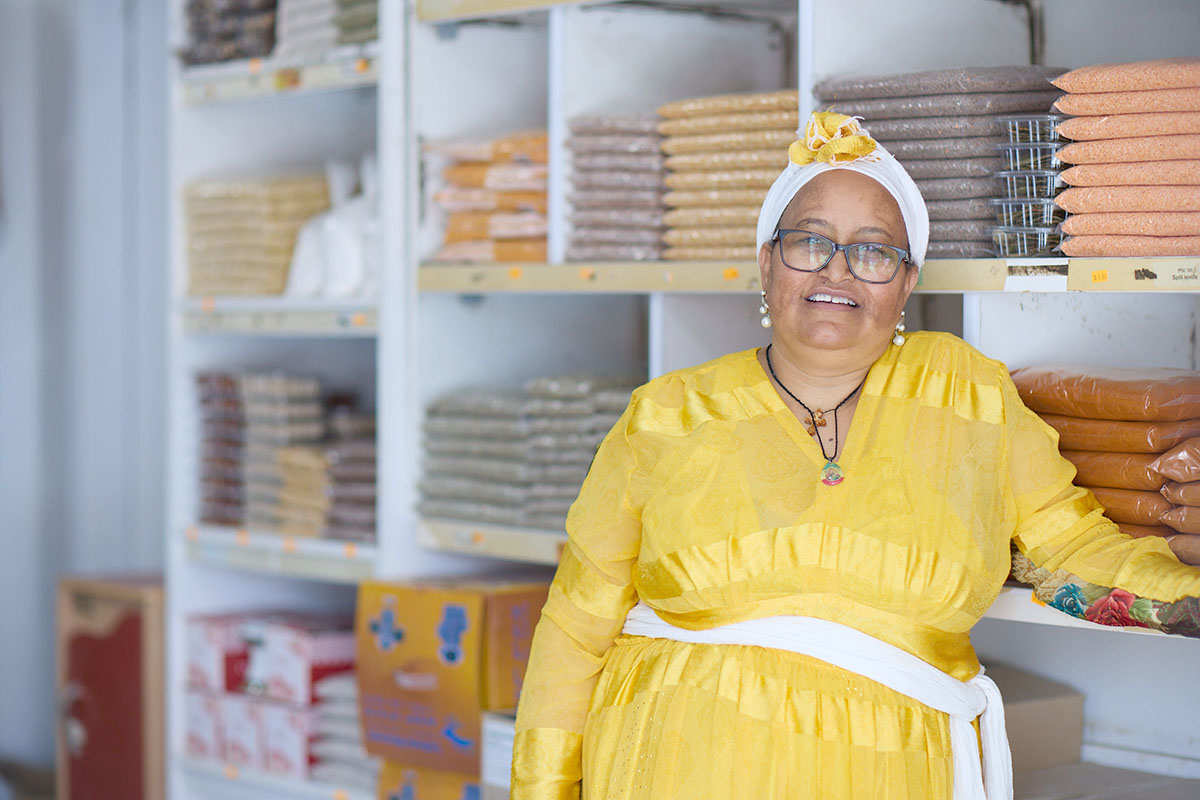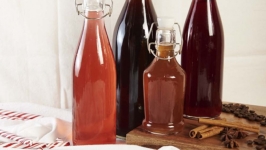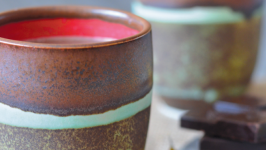Injera For All
Tizita Bekele has been selling injera from her bakeshop on Booth Street for 16 years. The walls beside her cash counter are decorated with certificates for community involvement and awards from Ottawa’s Ethiopian community. Her framed business licence from the City of Ottawa is dotted with each year’s sticker marking another year in business — Bekele points proudly to the colourful collage of timestamps denoting the longevity of a business that she jokes started as a bit of a coincidence.
Bekele met her husband, Asrdew Kebbede, in Kenya after they had both left Ethiopia as refugees. They eventually emigrated to Canada, settling first in Winnipeg. A visiting cousin from South Dakota gifted them their first injera grill so they could make the Ethiopian staple at home.
Several years later in Ottawa, Bekele was making injera for her son’s birthday party and guests clamoured for her to sell the Ethiopian flatbread. “Friends were paying more than market price,” Kebbede laughs, “they wanted to encourage her.” Bekele reminisces fondly about that time as those same friends would bring her large buckets from Costco to mix ever increasing volumes of dough to help her start a kind of injera pilot project from home. Buoyed by that encouragement, Bekele and Kebbede began looking for a storefront, and, in 2008, they opened the doors to Tizita’s Bakeshop in Centretown West.
Injera is a fermented bread; it’s made from teff flour, water and starter (itself a culture made of fermented teff flour and water.) No commercial yeast is required. Over the years, the production volume has increased, but Bekele’s injera “mother” and recipes have stayed the same. She continues to use the same dough starter that she’s had since opening the shop.
The shop sells what Bekele categorizes as “special” and “regular” injera. The “special” injera is darker in colour due to a high percentage (90 per cent) of brown teff flour and the other 10 per cent is made up of barley and quinoa flour. The regular injera is lighter, and made of 50 per cent brown teff flour, 10 per cent whole barley flour and 40 per cent whole wheat flour.
Both types of injera are sold in bags of four. One injera is roughly 16 inches in diameter and they are almost pancake-like with their tight bubbly crumb. They are thin yet spongey, and easy to tear by hand as injera is typically used to scoop up accompanying dishes. Bekele estimates that on average they sell almost 1,000 injera a day. Demand for the special injera tends to dwarf that of the regular kind due to the nutritious properties associated with the higher teff content.
Teff is an ancient grain that has been central to Ethiopian cooking for thousands of years. Along with injera, it is used to make porridge or thicken stews. The grain itself is small — about the size of a poppy seed — but is nutritiously dense. It is protein rich, full of calcium, high in fibre and gluten-free.
Several years ago, there was a teff flour shortage in Ethiopia and Kebbede realized that this could be a real threat to their Ottawa injera bakery. The bakery began importing whole grain teff to grind themselves in the shop. They now export their teff flour to clients in the United States and to other bakeries across Canada.
Along with the injera made daily, Bekele’s shop is stocked with pantry staples such as lentils, chickpeas, shiro (powdered chickpeas which make up the base of shiro wat — a typical Ethiopian stew — prepared with onions, garlic and other spices or vegetables), dehydrated injera, quinoa flour milled in house and an array of warm spices. For home brewers, there are coffee beans, teas and Ethiopian hops.
The couple did not come to Canada expecting to open a bakery. Bekele trained as a personal support worker and Kebbede’s educational background was in social work. He still finds time to help with the shop and manages the importing and exporting, but works full-time in public policy. He beams as he describes his wife as “a very, very industrious person.” Since receiving that first injera grill as a gift, they now own 11 to keep up with demand, and have five full-time staff in the bakery.
Many regular customers are from Ottawa’s Ethiopian, Eritrean and Somali communities, and the shop receives orders from folks looking for injera from Kingston to Montreal. Bekele has more than a dozen wholesale clients, including African and Arabic grocery stores across the city. Demand increases in the summertime, when there are more weddings, graduations and outdoor gatherings to cater. Requests spike again around Easter and Christmas, especially as many in the Ethiopian diaspora celebrate both holidays twice, following the Gregorian and Orthodox Christian calendars.
Though the star of the bakery, injera is not meant to be enjoyed on its own. It is typically topped with stews, salads or meats. Bekele and Kebbede both cite a lamb stew as their favourite accompaniment.
The shop also sells traditional Ethiopian coffee pots and large brightly coloured platters. Though they’re now mostly sold as decor, Bekele’s family explains that these dishes are wide enough to serve injera and its toppings traditionally: on one large platter, to be shared.
Whether for a family meal, contributing the bread for church functions or community events, Bekele and Kebbede say the injera is meant for sharing. “We don’t know what will happen tomorrow,” Kebbede says, “so we share what we have today.”
Tizita Bakeshop
365 Booth St., Ottawa
613.321.2343
Monday to Saturday, 8 a.m. to 8 p.m., Closed on Sundays













